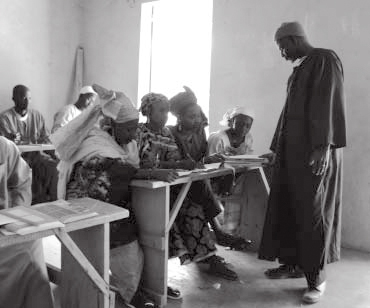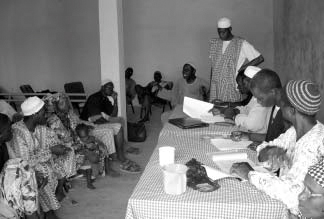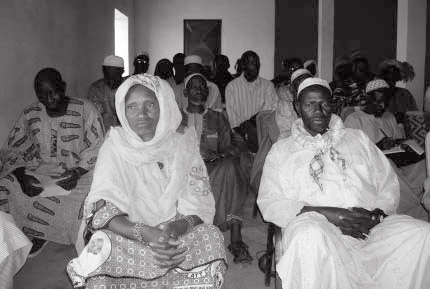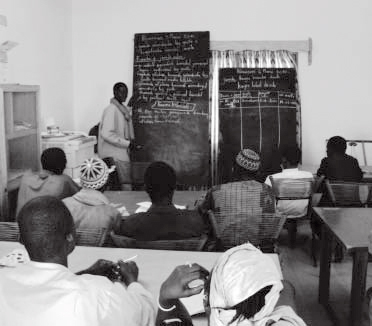Boubacar Ba
The following report from West Africa describes an example of community learning in Mali. In 1988, the NGO ÉVEIL (Programme Éducation Civique et Gouvernance), who works in the region of Mopti, started a project entitled “Literacy conscientisa tion based on the vision of Paolo Freire and the REFLECT method.” Boubacar Ba, coordinator of the project, reports in detail on the planning and goal-setting, and the various phases of implementation.
Literacy Conscientization and the Emergence of a Critical Mass in the Mopti Region of Mali
For several years, the stock of information on literacy methods has been greatly enriched in Mali with the promotion of various educational courses in several vil lages. The knowledge produced on training and learning has been particularly useful in the development of national programs such as DNAFLA1 responsible for supporting literacy programs. After 1991, along with the democratic changes, other methods and strategies of education and training have emerged. Various training methods in relation to innovation ensued in the area: Literacy conscienti zation (i.e.: “consciousness raising” and “critical consciousness”) advocated by the NGO ÉVEIL (awakening), is a method of convergent teaching and support to centers of education for development.
In 1988 the NGO ÉVEIL (operator for development in the region of Mopti in Mali) started a project of civic education and governance. Here is where a new approach emerged: Literacy conscientization based on the vision of Paolo Freire and the REFLECT method.
Evolution of Education Policies on Literacy
Non-formal education in Mali is defined through the Law on the Orientation of Education from December 29, 1999 as: “Education carried out in the adult literacy centers, the learning centers for women and the centers of education for development”.2 So the concept of non-formal education (NFE) is new in our context. During the first thirty years following independence, much was said about literacy. But it must be understood that literacy is nothing other than a broader goal.
In Mali, for a long time, there has been talk of functional literacy. It is practiced mainly through village associations. It even seems that a decree from 1962 made it mandatory for companies and state enterprises to undertake literacy training for their employees. In practice, the ODR and structures such as the Malian Company for Textile Development (CMDT), the Rice Office, the Office for Livestock Develop ment (ODEM) gave meaning to the policy by accessing large layers of basic learn ing communities.3 Later we will talk about “falling back into illiteracy” because the methodological foundations of the learning system and the lack of reading materials for literacy have mortgaged the results. The state is still reluctant to systematically use the national languages in the public media and civil documents. The Malian schools, after having hesitated for a long time to allow the national languages into the classrooms of formal education, are actually operating a two tier system. The work of teaching the national languages is left to convergent care classes, to the chagrin of a certain segment of parents of students not accepted for the extension of the method. Will it evolve, and how fast, towards an integration that removes these dichotomies that hold back the development process of our country? For it is not just about schools in the plural. Or lessons, in the plural. Within the single education system, where the anchors of the community can be better clarified, it is a question of erecting a pillar for development.
Vision and Strategy of the NGO ÉVEIL in the Mopti region of Mali
The vision of the NGO ÉVEIL in literacy and civic education is based on evolutionary policy and strategy. The approach has been built up gradually and moderately in the field since 1998. Subsequently, it has become a rich field of experience with some successes and constraints. With time and practice it was found that literacy and post-literacy are important stages and closely related to the process of improv ing the quality of education for learners and the control of local development activities. The two concepts consist of tools and means to achieve development goals and promote education, articulated with the use of knowledge gained, either for further training (reading, writing, arithmetic, the stages of specialized training, etc.), or to participate in local development activities (agriculture, health, civic, commercial, cultural, etc.). These two concepts are closely related and a complementary part of the process implemented by ÉVEIL.
The method advocated by ÉVEIL is based on the policy of non-formal education in Mali, which is defined through the Law on the Orientation of Education. The current approach is designed to be an extension of the activities of the NGO ÉVEIL in the field of civic education and democratic governance. After a generation of more or less new educational theories which have failed to meet the challenge of literacy and post literacy, a new approach is emerging called literacy conscientization, developed by ÉVEIL, practiced with original tools for training and educating the civil society. First of all, ÉVEIL intends to achieve literacy through an unveiling of reality from generative words that are associated with the social experience of learners. These generator words are chosen because they refer to the vocabulary universe of the members of literacy groups and because they encode the most concrete situations and the most central to their lives. This conscientization is achieved with literacy and the acquisition of a critical awareness vis-à-vis the values established by society.

Literacy course in Mali
Source: DVV International
The NGO ÉVEIL studied and was inspired by the methodology of Paolo Freire4 “pedagogy as a practice of transformation of society and education is a practice of freedom and a pedagogy of the oppressed.” In view of the path and the thought of Paolo Freire5 we could hardly have found a teacher who has had a greater impact than he on development in our area of operation. Many literacy programs have been designed according to his concepts. The vision of the NGO ÉVEIL is based on a voluntarist6 policy in step with a commitment that takes into account organizational aspects, staffing and language capabilities of decision networks in the population of the emerging civil society. To achieve such an approach the political vision of ÉVEIL deserves to be better understood. It is a practical translation between policies and strategies:
Policy 1: A reference to a structural transformation option in order to create a quality non-formal education, flexible, diversified and adapted to the context of social democratization
Strategy 1: Inserting a professional qualification component into the curriculum system of the education program for youth and adults
Strategy 2: Facilitation of various alternative methods of training learners in the same system through differentiated teaching and levels
Policy 2: Reference expansion and diversification of educational offers and demand stimulation with a consideration of social groups disadvantaged by the current context and environment: illiterate rural youth, rural women without access to literacy and advancement locally and whose basic rights are not protected
Strategy 1: Reinforcement of innovative best practices of education based on local groups called Yapinal7 which are in the process of being empowered to take charge of the concerns of the people
Strategy 2: Establishment of new educational methods taking into account alternative models with a type of non-formal education and designed for the com munity. With the production of quality learning, this option will be realized through strengthening the level of Convergent Pedagogy (CP) schools and of the Centers for Education Development (CED), with the aim of improving basic education through synergy with local decentralized collectives
A View of Literacy Conscientization, Comparing it to a Symphony:
Musical and Educational.
To date, the newest approach is known as literacy conscientization. This concept is a combination of basic literacy and civil education, following an integrated ap proach based on examples, cultural foundations and local knowledge of learners. It tries to harmonically orchestrate the needs of education in the literate environ ment of learners. The method of civic education is integrated with literacy in order to popularize the concepts relating to rights both civic and civil, institutional and educational. The method is based on principles, with an orderly and rational use of techniques based on the cultural knowledge of the learners.

Literacy course in Mali
Source: DVV International
ÉVEIL places learners at the heart of the education process and this in direct rela tion to the participatory movement. Learners are in the epicenter of the method. The method is sectoral, because specifically with education (literacy, citizenship, intermediation, governance) it has an overarching and systemic nature. It takes into account the complexity of situations and the diversity of targeted actors: youth, women, farmers, opinion leaders, traditional authorities, local elected officials. From a conceptual standpoint, the approach is structured with various participatory tools and is consistent with the geographical and institutional realities in the intervention area. The focal point of the participatory tools is animation, transversal action.
The monitoring framework for literacy conscientization is defined with indicators addressing the improvement of knowledge, the degree of organizational initiatives at family, village and commune level. The learners’ progress is measured on the basis of understanding the tools, method of use of knowledge and the types of decisions involving men and women in different localities on the ground. ÉVEIL is opposed to any pedagogy that regards people as objects of training which is served from a package of predetermined knowledge. Every person has, accord ing to Paolo Freire: “an ontological vocation to be a subject endowed with critical awareness and to be the subject and creator of their own education.” Hence the implementation of a literacy program designed to transform the citizen and society using awareness and mobilization for social change.
The Literacy Conscientization Method and the REFLECT Approach
The concept of literacy conscientization is born of a desire to ensure the quality and type of education adapted to learners in a context of democracy and decentrali zation in Mali. This approach is a praiseworthy attempt to overcome the conflict between traditional literacy and the developmental approach.
And it builds on the existing institutional context initiated after 1991 by the communalization process, democratization and strengthening of the rule of law in Mali. Literacy conscientization aims to go beyond what has been imagined so far in terms of learning method, training and education for local people. It is also suitable for emerging educational innovations because it promotes convergence pedagogy and education centers for development with the provision of an educa tional approach and innovative teaching (grammar paradigms related to linguistic paradigms, use of metalanguage for teaching the Fula language, lexicology im provement and lexicography of the language ...).
The REFLECT 8 approach in turn is based on an assumption that a dynamic process of literacy can be the engine of development by strengthening community dynamics. The approach builds on key concepts that include bringing literacy to learners so they are aware of their capabilities, to foster a dialogue that develops the critical skills of learners taking into account the social progress of learners and the promo tion of social movement citizen groups which are not literate.
The fundamental difference between the REFLECT method and the classic method is that with REFLECT no syllabus or curriculum is made available to learning group participants. The starting point of the learning process is a dialogue around a concern the participants have. Dialogue leads to the construction of graphics on the ground, based on participatory rural appraisal (PRA) techniques and using maps to advance literacy.

Participants in a panel discussion in Mali
Source: DVV International
Literacy Conscientization, Improving the Quality of Education and Citizen Initiatives
The conscientization9 method of literacy carries a different conception of learning for essentially rural people. This is the construction of an “educational model” that takes into account societal values and the values derived from the vision of Brazil ian educator Paulo Freire. The approach is based on the one hand on the devel opment of knowledge related to the new State in the process of democratization and on the other hand integrates active and participatory methods (REFLECT, PRA, Gender and social analysis, rule of law and governance...). The NGO ÉVEIL led implementation through design of manuals including literacy levels 1, 2, 3, 4 and 5, a numeracy level 1 and 2 and a glossary of civics. Each level contains themes of civic education, democratic governance, citizenship and inclusive literacy. The approach deals with the grammatical mechanisms of the Fula language based on concepts and themes of civic education: the literate environment, citizenship and democratic citizenship, local development.
These approaches to literacy have mixed results, especially regarding the reuse of acquired literacy skills. In light of the teaching methods, real difficulties appeared in the consolidation of irreversible literate skills, adequate content and curriculum and the sustainability of acquired literacy. New approaches appeared in the field with different degrees of experimentation, among which were the pedagogy of the text, REFLECT and convergent teaching.
The REFLECT method is being tested as a participatory approach now that the convergent pedagogy (CP) method used in the formal system is at the basic (elementary) school stage. With the pedagogy of the text, unlike in conventional approaches, it is not considered necessary to repeat concepts to adults, but rather to encourage them to think for themselves through logical deductions. To apply this principle, an interaction, a dialogue with adults has to be initiated which has their empirical knowledge and their daily concerns as a basis for discussion. Hence the similarity with the conscientization approach that uses learning outcomes to ap propriate knowledge of the subject and techniques. If the text pedagogy is based on textual genres, on the production parameters of a text or on the learning of the development of text, the process of conscientization literacy goes beyond teaching the understanding of texts to achieve a comprehensive political vision of chang ing the individual and society. The basic change is to actually allow the voice of citizens, their writing, their emerging act in a specific way.
Conclusions
When in 1992 the Ministry of Education initiated the overhaul of the education system, another vision emerged, with the creation of a national resource center and non-formal education (CNR-ENF) and an institute of languages: Abdoulaye Barry (ILAB). There was a break-up and new structures to meet specific missions. At the time it seemed to be abrupt. New structures have emerged, all important to each other: ILAB, CNR-ENF, Karanta Foundation, African Academy of Languages.
So much for the state sector.
In terms of private operators, publishers have taken over the production of materi als in national languages, a mission long devoted to DNAFLA. At this stage, the development of education will result in synergy between public, national NGO activists and private sector publishing.10
In order for NFE to make progress, it is important that policymakers put in place a legal framework of incentives that ensure stakeholders national financial sup port from the state. Without this state commitment alongside credible operators to periodically evaluate the rest, there will be no lasting effect. The operators will always be institutionally insecure since their support will only come from foreign partners.
If one considers that the fundamental purpose of NFE is to encourage the emer gence of a critical mass able to position itself locally as a lever of political, social and economic development, we can say that much remains to be done. Serious political contingencies make life very conflicted in the village or community. The players are divided in terms of interest relating to the control of local finances and other forms of enjoyment of the powers conferred by the grip they have on the levers of policy. How should we interpret the emergence of the “independents” that have appeared as political forces in recent research? Not everything can be explained by the renunciation of classic politics. Nearly fifteen years after the break-up move ments and radicalization that led to the revolution of March 1991, critical political mass has been formed. Its level of training in civic education and governance is certainly inadequate. The characteristic of a critical mass is its ability to find within itself and in a quite endogenous manner, the keys to formulating its own concepts and rules of good citizenship. That is where non-formal education comes in.
In light of the assessment of the method during the last decade, the evidence of assessment practices and lessons are geared toward the expansion of actions at national and subregional levels, taking into account the transnational language atmosphere (Pulaar in Senegal and Mauritania, Fula Mali, Niger, Burkina Faso and Guinea).
Our practice in the field has enabled us to note these lessons:
- Actors from civil society position themselves in the process of human rights education to better defend their rights.
- New actors from the emerging civil society are the interlocutors of decentralized collectives and local people in defense of human rights.
- Social mediation requires the establishment of appropriate frameworks: a forum for consultation, dialogue frameworks between local actors.
- Human rights education and citizen training participate in the dialogue of cultures and social change.
- Capitalize on the ÉVEIL experience and the extension of its program into other local areas.
The NGO ÉVEIL received financial support from several partners such as:
- The project for civic education and governance (PECG, Mopti Cercle), sup ported by the Stromme Foundation, Norwegian partner.
- The project for strengthening the capacity of participation of farmers (PRCP, Mopti Cercle) supported by Comic Relief, British partner.
- The local governance project in the town of Sio (PAGS, Mopti Cercle), sup ported by DIAKONIA, a Swedish partner.
- The governance project of the town of Pignari Bana (Bandiagara Cercle, Mopti region) with DVV International (Germany).
The entire program consists of twenty municipalities in the Mopti Cercle, Bandiagara and Bankas. The process of civic education has produced the following results:
- Production of twenty manuals on education and literacy conscientization.
- Opening of 75 literacy centers or intensive training centers (CFI) in the whole area.
- Opening of 25 REFLECT groups led by village moderators in the Mopti Cercle and the town of Ban Pignari (Bandiagara Cercle).
- Opening of 10 centers or community learning groups (GAC) in the town of Sio (Mopti Cercle).
- Training of 300 villagers as relay trainers in Yapinal with the capacity of be ing village educators with advanced skills in technical training (upper level in integrated literacy with concepts of law, citizenship, conflict resolution and local management of natural resources). These relay trainers are active in various localities in the Mopti Cercles, Bankas and Bandiagara.
- Formation of a critical mass of 2000 learners trained in literacy with skills in reading, writing and numeracy in all areas of the intervention zone.
- Formation of a network of 40 village writers and 20 library funds with expertise developed in the literate environment.
- Linking of 100 paralegals trained in the entire program with village leaders in order to promote local development: participation in municipal elections (voting awareness, distribution of ballots, assessors, polling station directors), support the establishment of civil documents (identity cards, family books, birth certificates...), support for alternative ways to resolve local conflicts in the vil lage, production of various texts and articles published in the journal Kabaaru, participation in citizens’ initiatives at the municipal and village level.
- Strengthening the capacity of 30 CED educators and 20 teachers in schools with convergence education at the level of animated teaching centers in the Mopti Cercle.
The evidence is that a critical mass is emerging whose weight is beginning to be felt in social and political changes.
Beyond these reflections on the importance of literacy in our society, we observe that the perceptions of the citizenry, especially the rural youth, has changed dra matically since the introduction of democracy and decentralization in our country. It is indisputable that the critical mass of neo-literates, village writers and parale gals controlling the literate environment has the ability to make major changes to improve the living conditions of people in the fight against poverty.

Literacy course in Mali
Source: DVV International
Bibliography
A. Cardinet – Dunod: Pratiquer la médiation en pédagogie – 1995 .
Boubacar Ba: Pouvoirs, ressources et développement dans le Delta central du Niger, Edition l’Harmattan/La Sahélienne, 2008.
Démarche REFLECT: document de base de l’ONG ÉVEIL, 2006.
Document de vision et de politique de l’ONG Éveil, 2006.
Document de politique nationale de l’éducation non formelle, 2007.
DVV International: Adult Education and Development N°69, 2007.
DVV International – Pamoja Mali: Outils utilisés pour l’analyse des thématiques dans les cercles REFLECT, 2009.
Ismaîla Samba Traoré: Emergence d’une masse critique au Macina, cas de l’expérience de l’ONG ÉVEIL, 2005.
Jurgen Habermas: La théorie de l’agir communicationnel-tome 1 et 2 – Fayard 1981.
Paolo Freire, Pédagogie des oppressés,1971.
Plan stratégique de l’ONG ÉVEIL de 2003-2007.
Production documentaire sur La mise en oeuvre du PRODEC, la PC et les CED au MALI.
Rapport d’appui méthodologique de l’ONG ÉVEIL-FARY S KA en octobre 2003.
Rapport du projet d’appui à la gouvernance dans la commune de Pignari Bana (Cercle de Bandiagara) avec l’appui financier de DVV International.
Notes
1 The National Directorate of Literacy and Applied Linguistics.
2 Text by Ismaila Traoré Samba editor of the Sahel: Emergence of a critical mass in Macina: Experience of the NGO ÉVEIL in Mali.
3 Ismaîla Samba Traoré, op. cit.
4 Pedagogy of the Oppressed by Paulo Freire, 1971 .
5 The journal “Adult Education and Development” N° 69 – 2007, on the occasion of the tenth anniversary of the death of Freire.
6 Document on the policy and vision of the NGO ÉVEIL – 2007.
7 Yapinal: Relay animators/trainers/para legals of the NGO ÉVEIL.
8 REFLECT: approach combining literacy and the methods of Paolo Freire.
9 The conscientization approach advocated by the NGO ÉVEIL based on the vision of Paolo Freire and literacy in the Fula language spoken in the area.
10 Ismaîla Samba Traoré, op. cit.


